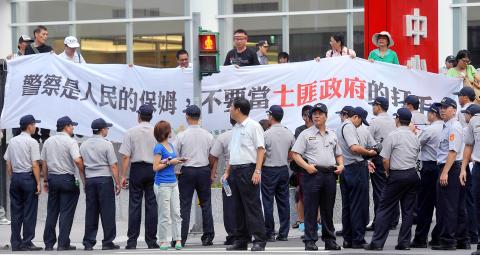The preliminary legislative review of the controversial cross-strait service trade agreement scheduled for today was temporarily postponed and two more public hearings are to be held instead in response to continuing opposition from the public to the legislature ratifying the agreement.
Academics and representatives of civic groups apprehensive of opening up the nation’s service sector to Chinese investors continued to call for lawmakers to take citizens’ opinions into account through a deliberative democracy process before the agreement is reviewed in the legislature.
Lawmakers from the Democratic Progressive Party (DPP) and the Taiwan Solidarity Union have voiced support for the demand that the impact on each industry covered by the trade agreement be discussed at a separate public hearing, with business owners and representatives of those employed in the sector invited to talk about their views before the legislative review begins.

Photo: Chien Jung-fong, Taipei Times
The Chinese Nationalist Party (KMT) did not agree to the request.
Two separate public hearings were held yesterday by a joint committee led by the Internal Administration Committee, entrusted by the legislature’s plenary session to do a preliminary review of the agreement.
The preliminary review was scheduled for today, but the KMT agreed to postpone the meeting after it turned down a request by the DPP and the TSU that protesters rallying outside the legislature be allowed to be present at yesterday’s public hearing as observers.
A total of 28 representatives from academia, business associations and civic organizations were invited to present their views on the agreement, while Mainland Affairs Council Minister Wang Yu-chi (王郁琦), Straits Exchange Foundation (SEF) Chairman Lin Join-sane (林中森) and Minister of Economic Affairs Chang Chia-juch (張家祝) were also present.
At the hall, which can accommodate hundreds of people, most of the seats were taken by legislative assistants and officials from various departments.
The government signed the agreement with China without consulting affected industries and the public, and now “you mobilized officials and legislative assistants to occupy the seats that were supposed to belong to the people,” DPP Legislator Lin Shu-fen (林淑芬) said.
KMT Legislator Lin Hung-chih (林鴻池) said that it was against the rules to allow people to attend the meeting unless they have applied to attend beforehand.
At the hearing, several representatives of groups opposing the agreement emphasized the need for lawmakers to listen to people’s opinions.
“We demand that the legislature hold a public hearing specifically for each industry and that all related information be made available before a public hearing is held,” Chung Yuan Christian University associate professor of financial law Hsu Wei-chun (徐偉群) said.
The legislature should enact a law to regulate how the government assesses the impact of trade agreements on the nation and to require the government to present what policy it will adopt for industries covered by a trade pact following its implementation so people can better predict how the liberalization will affect local industries, Hsu said.
Terry Chang (張天立), president of online bookstore TAAZE and founder of books.com.tw, said he doubted that officials involved in the negotiations have a basic understanding of the industries covered by the agreement.
“This is not a trivial thing. I call on officials to reconsider the agreement and politicians in both the blue and the green camps to put away partisanship to work together to protect the country’s publishing industry,” Chang said.

Taipei has once again made it to the top 100 in Oxford Economics’ Global Cities Index 2025 report, moving up five places from last year to 60. The annual index, which was published last month, evaluated 1,000 of the most populated metropolises based on five indices — economics, human capital, quality of life, environment and governance. New York maintained its top spot this year, placing first in the economics index thanks to the strength of its vibrant financial industry and economic stability. Taipei ranked 263rd in economics, 44th in human capital, 15th in quality of life, 284th for environment and 75th in governance,

Greenpeace yesterday said that it is to appeal a decision last month by the Taipei High Administrative Court to dismiss its 2021 lawsuit against the Ministry of Economic Affairs over “loose” regulations governing major corporate electricity consumers. The climate-related lawsuit — the first of its kind in Taiwan — sought to require the government to enforce higher green energy thresholds on major corporations to reduce emissions in light of climate change and an uptick in extreme weather. The suit, filed by Greenpeace East Asia, the Environmental Jurists Association and four individual plaintiffs, was dismissed on May 8 following four years of litigation. The

A former officer in China’s People’s Liberation Army (PLA) who witnessed the aftermath of the 1989 Tiananmen Square massacre has warned that Taiwan could face a similar fate if China attempts to unify the country by force. Li Xiaoming (李曉明), who was deployed to Beijing as a junior officer during the crackdown, said Taiwanese people should study the massacre carefully, because it offers a glimpse of what Beijing is willing to do to suppress dissent. “What happened in Tiananmen Square could happen in Taiwan too,” Li told CNA in a May 22 interview, ahead of the massacre’s 36th anniversary. “If Taiwanese students or

The New Taipei City Government would assist relatives of those killed or injured in last month’s car-ramming incident in Sansia District (三峽) to secure compensation, Mayor Hou You-yi (侯友宜) said yesterday, two days after the driver died in a hospital. “The city government will do its best to help the relatives of the car crash incident seek compensation,” Hou said. The mayor also said that the city’s Legal Affairs, Education and Social Welfare departments have established a joint mechanism to “provide coordinated assistance” to victims and their families. Three people were killed and 12 injured when a car plowed into schoolchildren and their